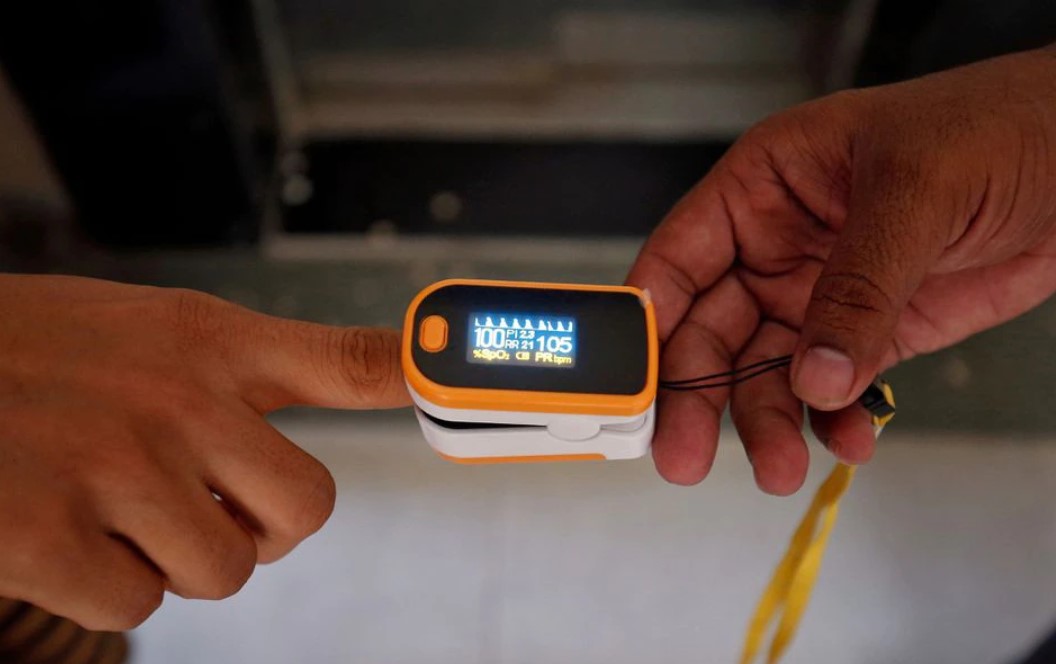Medical device makers and scientists are working on new technologies to improve widely-used devices that assess potential heart and respiratory problems given mounting evidence that current ones could lead to inadequate healthcare for patients with darker skin.
Doctors have long known that pulse oximeters are less accurate in estimating blood oxygen levels in non-white patients, but the discrepancies were considered insignificant. The COVID-19 pandemic exposed some of the real dangers of these flaws, as the devices gave falsely high oxygen readings in patients with dark skin.
As a result, some patients faced COVID treatment delays or were denied treatment, and some were discharged from emergency rooms instead of receiving care, researchers found, adding to the litany of healthcare disparities experienced by non-white populations.
Expert advisers to the US Food and Drug Administration met virtually on Tuesday to discuss improvements in standards for pulse oximeters.
The devices, which clip to a fingertip, pass red and infrared light through the skin and measure how much light is absorbed by oxygen-carrying hemoglobin. Melanin pigment in darker skin also absorbs the light, however, and current devices do not adjust for that effect.
To address the problem, some researchers are testing devices that use other wavelengths of light not absorbed by melanin.
Among the furthest along in development is a sensor from Rockley Photonics Holdings that uses spectrophotometers and laser instruments on chips to emit a broad spectrum of light, which the company says more accurately monitors not only blood oxygen but also hydration, blood pressure and other biomarkers.
Rockley Chief Executive Andrew Rickman told Reuters his company plans to begin shipping the product next month to companies that would package it into wearable and other devices. Customers include Medtronic Plc (MDT.N), a major manufacturer of oximeters, which announced a partnership with Rockley in March. It is not clear when the new devices will become available.
At Brown University, researchers Kimani Toussaint and Rutendo Jakachira are experimenting with light at wavelengths insensitive to melanin.
Valencia Koomson of Tufts University is developing a device that takes into account a patient’s skin tone and presence of melanin to better adjust oxygen level estimates.
All agree that more accurate pulse oximeters are long overdue.
Imarc Group market research firm forecast the global pulse oximeter market reaching $3.25 billion by 2027.
‘ENORMOUS’ PROBLEM
In recent years, studies have shown that low oxygen levels more often go undetected in Black adults and infants, and that Black patients receive less supplemental oxygen than similarly ill white patients due to pulse oximeter inaccuracies.
COVID amplified those risks. The coronavirus can cause dangerously low oxygen levels even before a patient feels out of breath or appears to be in distress, making healthcare providers even more dependent on accurate oximeter readings.
Pulse oximeter problems “suddenly became enormous” during the pandemic, said Dr. Philip Bickler, director of the University of California, San Francisco’s (UCSF) Hypoxia Research & Pulse Oximeter Test Facility.
Bickler, whose laboratory analyzes pulse oximeter accuracy for manufacturers, said he believes industry leaders “are all working to address the devices’ shortcomings.”
Experts say the FDA needs to strengthen its criteria for approving new devices. Current rules require that pulse oximeters be tested in a minimum of just 10 subjects, only two of whom must be “darkly-pigmented.”
When more than 10 subjects are involved, only 15 per cent must be non-white, although some manufacturers do test in larger, more racially-balanced groups. The agency does not require a standardized assessment for classifying skin pigmentation, tools that would be critical in evaluating inaccuracies.
FDA staff speaking at Tuesday’s meeting acknowledged that although variables in sick patients affect accuracy, pulse oximeters are tested under “ideal” laboratory conditions in healthy individuals. Pediatric devices are tested in small adults rather than children or infants.
In advance of the meeting, some pulse oximeter manufacturers appeared open to discussing improvements while maintaining that their devices worked well.
Medtronic told Reuters it “looks forward to sharing perspectives and recommending ways we can collaborate with other industry members, standards organizations, clinicians, researchers and academics to continue to strengthen these technologies.”
Medical technology company Masimo Corp (MASI.O) said its equipment does not have “a bias problem between Black and white subjects.” Still, the company told Reuters, “we will continue to improve our pulse oximeters.”
For now, Tufts’ Koomson said, devices that are less accurate on dark skin and in sicker individuals will remain in wide use.
The first step to ensure appropriate access to care requires raising awareness about the potential inaccuracies, especially among healthcare providers, she said.
While the devices are still useful, UCSF’s Bickler said, doctors “should not base patient care only on pulse oximeter findings.”







Click here to change your cookie preferences